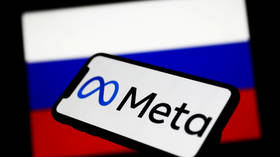Meta clarifies policy on calls for assassinating heads of state

Facebook’s parent company Meta has changed its policy guidance on tolerance to hate speech to prohibit “condoning violence” against “Russians in general” and to ban calls for the death of heads of state, Reuters reported on Monday, citing a memo posted on the company’s internal platform.
The Sunday post, published by Meta’s global affairs president, Nick Clegg, and seen by Reuters, suggests that Facebook is “narrowing the focus” of its content moderation policy to make it “explicitly clear” that a previous decisions made last week should not be interpreted as “condoning violence against Russians in general.”
Last Thursday, Reuters was also the first to report that Meta would begin allowing hate speech against Russians on Facebook and Instagram. Citing another batch of internal emails, the news agency initially reported that the platform would allow hate speech against all Russians amid the ongoing war in Ukraine. However, it later toned down its text to explain the measure referred specifically to the “invading Russians” and President Vladimir Putin.
Now Meta has apparently backtracked on that policy too, with Clegg reportedly writing that it would “not permit calls to assassinate a head of state.”
“In order to remove any ambiguity about our stance, we are further narrowing our guidance to make explicit that we are not allowing calls for the death of a head of state on our platforms,” he wrote.
He added that since the situation in Ukraine is fast-moving, Meta will keep its guidance “under constant review” and claimed Meta “stands against Russophobia.”
The platform has “no tolerance for calls for genocide, ethnic cleansing, or any kind of discrimination, harassment, or violence towards Russians on our platform,” he said.
Meta’s earlier decision on violence against Russians was even met with criticism from the United Nations, with a spokesman for the UN Secretary-General Antonio Guterres saying that such language is “unacceptable” in any context.
The social media giant had tried to tone down and justify its decision by calling it a “temporary” measure aimed solely at allowing Ukrainians to freely vent their anger over the ongoing Russian military offensive, with Clegg saying the policy would only apply in Ukraine itself.
The move also sparked fury in Russia, with the nation’s media watchdog Roskomnadzor banning Instagram from March 14. On Sunday, Instagram head Adam Mosseri, blasted the decision, arguing it would cut off 80 million Russian Instagram users “from the rest of the world.”
Russia’s Prosecutor General filed a legal complaint with the nation’s courts demanding all Meta platforms be outlawed and the company itself be designated an extremist organization in Russia over allowing hate speech against the country’s nationals. Facebook was banned in Russia even before these developments over discrimination towards state-owned and state-affiliated Russian media outlets.













